Tourism in India
Tourism in India is important for the country's economy and is growing rapidly. The World Travel and Tourism Council calculated that tourism generated ₹16.91 lakh crore (US$240 billion) or 9.2% of India's GDP in 2018 and supported 42.673 million jobs, 8.1% of its total employment.[2] The sector is predicted to grow at an annual rate of 6.9% to ₹32.05 lakh crore (US$450 billion) by 2028 (9.9% of GDP).[3] In October 2015, India's medical tourism sector was estimated to be worth US$3 billion, and it is projected to grow to US$7–8 billion by 2020.[4] In 2014, 184,298 foreign patients traveled to India to seek medical treatment.[5]
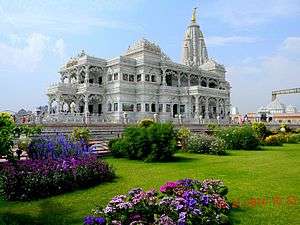



-01.jpg)
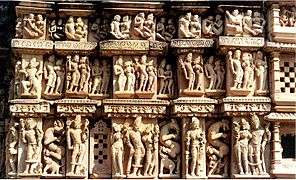
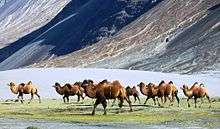
Over 10.04 million foreign tourists arrived in India in 2017 compared to 8.89 million in 2016, representing a growth of 15.6%.[6][7][8] Domestic tourist visits to all states and union territories numbered 1,036.35 million in 2012, an increase of 16.5% from 2011.[9] In 2014, Tamil Nadu, Maharashtra and Uttar Pradesh were the most popular states for tourists.[10] Delhi, Mumbai, Chennai, Agra and Jaipur were the five most visited cities of India by foreign tourists during the year 2015. Worldwide, Delhi is ranked 28th by the number of foreign tourist arrivals, while Mumbai is ranked 30th, Chennai 43rd, Agra 45th, Jaipur 52nd and Kolkata 90th.[11]
The Travel and Tourism Competitiveness Report 2019 ranked India 34th out of 140 countries overall. India improved its ranking by 6 places over the 2017 report which was the greatest improvement among the top 25% of countries ranked. The report ranks the price competitiveness of India's tourism sector 13th out of 140 countries. It mentions that India has quite good air transport infrastructure (ranked 33rd), particularly given the country's stage of development, and reasonable ground and port infrastructure (ranked 28th). The country also scores high on natural resources (ranked 14th), and cultural resources and business travel (ranked 8th).[12] However, some other aspects of its tourism infrastructure remain somewhat underdeveloped.[13] The nation has many hotel rooms per capita by international comparison and low ATM penetration.[14] The World Tourism Organization reported that India's receipts from tourism during 2012 ranked 16th in the world, and 7th among Asian and Pacific countries.[15]
The Ministry of Tourism designs national policies for the development and promotion of tourism. In the process, the Ministry consults and collaborates with other stakeholders in the sector including various central ministries/agencies, state governments, union territories and private sector representatives. Concerted efforts are being made to promote niche tourism products such as rural, cruise, medical and eco-tourism.[16] The Ministry of Tourism maintains the Incredible India campaign focused on promoting the tourism in India.
Visa policy of India

India requires citizens of most countries to hold a valid passport and apply for a travel visa at their local Indian embassy or consulate, before their visit. Travellers can apply directly by mail or in person, or through their local travel services company. India has recently implemented an online method for citizens of 168 countries to apply for an e-Tourist Visa.[21]
Nationals of Bhutan, Maldives and Nepal do not require a travel visa to enter India. Citizens of Afghanistan, Argentina, Bangladesh, DPR Korea, Jamaica, Maldives, Mauritius, Mongolia, Nepal, South Africa and Uruguay are not required to pay a fee when obtaining an Indian visa.[22][23]
A Protected Area Permit (PAP) is required to enter the states of Nagaland and Sikkim and some parts of the states of Arunachal Pradesh, Himachal Pradesh, Jammu and Kashmir, Manipur, Mizoram, Rajasthan and Uttaranchal. A Restricted Area Permit (RAP) is required to enter the Andaman and Nicobar Islands and parts of Sikkim. Special permits are needed to visit the Lakshadweep islands.[24]
e-Tourist Visa
As a measure to boost tourism,[25] the Indian Government implemented a new visa policy in November 2014, allowing tourists and business visitors to obtain a "visa on arrival" at 28 international airports, by acquiring an Electronic Travel Authorisation (ETA) online before arrival, without having to visit an Indian consulate or visa centre.[26] In April 2015, the "visa on arrival" scheme was renamed "e-Tourist Visa" (or "e-TV") to avoid confusion.[27]
The e-Tourist Visa facility requires a tourist to apply online on a secure Government of India website, at least four to thirty days before the date of travel. If approved, the visitor must print and carry the approved visa with their travel documents. The visa allows holders of an ETA to enter and stay anywhere in India for a period of ninety days except for citizens of US, UK, Japan and Canada. Citizens of these countries can stay for up to 180 days at a time.[28] an ETA can be obtained twice in a single calendar year.[21]
India first introduced its "visa on arrival" facility on 27 November 2014, to citizens of the following countries: Australia, Brazil, Cambodia, Cook Islands, Djibouti, Fiji, Finland, Germany, Indonesia, Israel, Japan, Jordan, Kenya, Kiribati, Laos, Luxembourg, Marshall Islands, Mauritius, Mexico, Micronesia, Myanmar, Nauru, New Zealand, Niue, Norway, Oman, Palau, Palestine, Papua New Guinea, Philippines, Russia, Samoa, Singapore, Solomon Islands, South Korea, Thailand, Tonga, Tuvalu, UAE, Ukraine, USA, Vanuatu and Vietnam.[21] On 30 July 2015, the facility was extended to China, Macau and Hong Kong.[29] On 15 August 2015, the facility was further extended to citizens of Andorra, Argentina, Armenia, Aruba, Belgium, Bolivia, Colombia, Cuba, East Timor, Guatemala, Hungary, Ireland, Jamaica, Malta, Malaysia, Mongolia, Monaco, Mozambique, the Netherlands, Panama, Peru, Poland, Portugal, Seychelles, Slovenia, Spain, Sri Lanka, Saint Lucia, Saint Vincent and the Grenadines, Suriname, Sweden, Taiwan, Tanzania, Turks and Caicos Islands, the United Kingdom, Uruguay and Venezuela.[30] The facility should eventually be expanded to about 180 countries.
As a result of the new visa policy, 56,477 tourists arrived on an e-Tourist Visa during October 2015, compared with 2,705 tourist arrivals during October 2014 (just before the facility was introduced), representing a 1987.9% increase. During the period from January to October 2015, a total of 258,182 tourists arrived on an e-Tourist Visa, a 1073.8% increase on the 21,995 tourist arrivals during the same period in 2014 (before the e-Tourist Visa was available).[31]
Statistics
Foreign tourist arrivals and foreign exchange earnings
|
|
Foreign tourist arrivals by source country
| Rank | Country | Number | Share in % |
|---|---|---|---|
| 1 | 2,256,675 | 21.37 | |
| 2 | 1,456,678 | 13.80 | |
| 3 | 1,029,758 | 9.75 | |
| 4 | 353,684 | 3.35 | |
| 5 | 351,040 | 3.32 | |
| 6 | 346,486 | 3.28 | |
| 7 | 319,172 | 3.02 | |
| 8 | 281,768 | 2.67 | |
| 9 | 274,087 | 2.60 | |
| 10 | 262,309 | 2.48 | |
| Total of top 10 | 6,931,657 | 65.65 | |
| Other countries | 3,626,272 | 34.35 | |
| Grand total | 10,557,929 | 100 | |
Foreign and domestic tourist visits by State
|
| ||||||||||||||||||||||||||||||||||||||||||||||||||||||||||||||||||||||||||||||||||||||||||||||||||||||||||||||||
World Heritage sites
There are 38 World Heritage sites in India that are recognised by the United Nations Educational, Scientific and Cultural Organization (UNESCO) as of August 2019.[35][36] These are places of importance of cultural or natural heritage as described in the UNESCO World Heritage Convention, established in 1972.[37]

Gallery
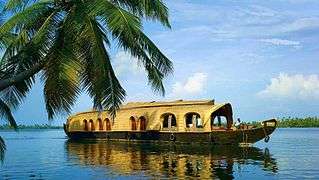
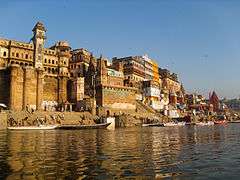
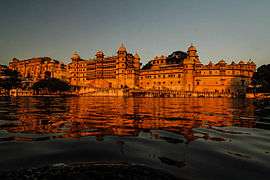
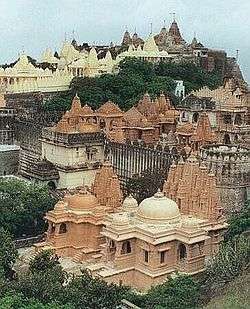
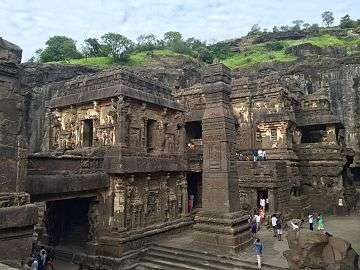
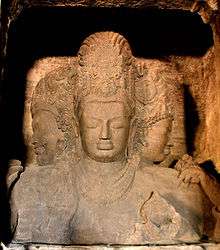
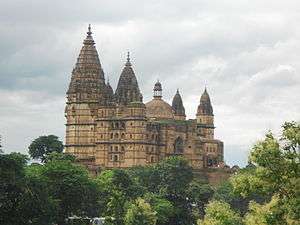
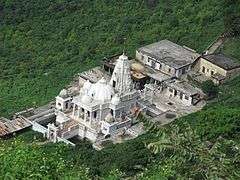
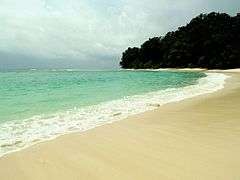 Radhanagar Beach on Havelock Island
Radhanagar Beach on Havelock Island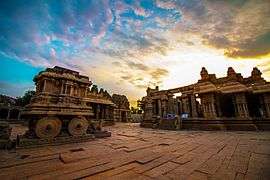 Stone chariot in Hampi
Stone chariot in Hampi
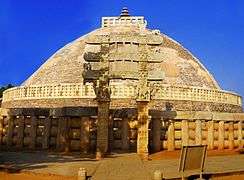 Great Stupa at Sanchi
Great Stupa at Sanchi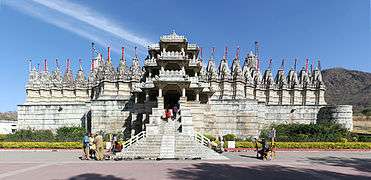

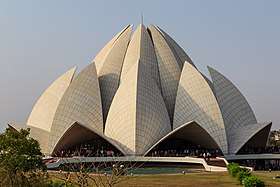 Lotus Temple in Delhi
Lotus Temple in Delhi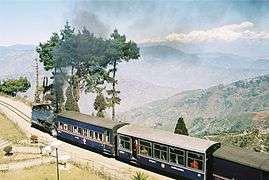 Heritage train in Darjeeling
Heritage train in Darjeeling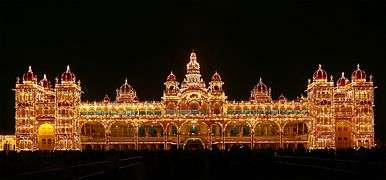 Mysore Palace illuminated at night
Mysore Palace illuminated at night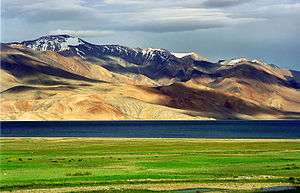 Tso Moriri in Ladakh
Tso Moriri in Ladakh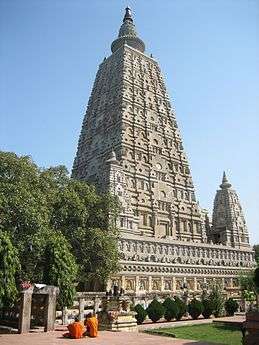


.jpg)
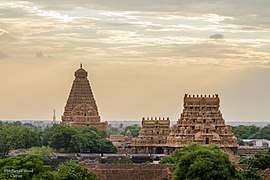
Outline of Tourism in India
|
|
References
- Quach, Due (2018), Calm Clarity: How to Use Science to Rewire Your Brain for Greater Wisdom, Fulfillment, and Joy, Penguin, p. 84, ISBN 9781524704803
- "2019 ANNUAL RESEARCH: KEY HIGHLIGHTS" (PDF). WTTC. Archived from the original (PDF) on 30 December 2019. Retrieved 15 March 2019.
- "Travel & Tourism Economic Impact 2018 India" (PDF). World Travel and Tourism Council. Retrieved 22 March 2017.
- "Indian medical tourism industry to touch $8 billion by 2020: Grant Thornton – The Economic Times". The Economic Times. Retrieved 16 April 2016.
- "Promotion of Medical Tourism". Press Information Bureau. Retrieved 28 April 2016.
- Sanjay Kumar (15 January 2018). "15.2% Growth in Foreign Tourist Arrivals in December, 2017 Over December, 2016; 48.3% Growth in Foreign Tourist Arrivals on e-Tourist visa in December, 2017 Over December, 2016". Press Information Bureau, Government of India, Ministry of Tourism. Retrieved 7 March 2018.
- Team, BS Web (17 January 2018). "India attracted 10 mn foreign tourists in 2017, sports to bring more". Business Standard India. Retrieved 11 February 2018.
- "Performance of Tourism Sector during December, 2016" (PDF). Ministry of Tourism. Retrieved 28 February 2017.
- "India's Domestic Tourists increase by 16% crossing 1 Billion Mark". news.biharprabha.com. Indo-Asian News Service. Retrieved 21 February 2014.
- "Tamil Nadu, UP pip Goa as tourist havens".
- Bremner, Caroline. "Top 100 City Destinations Ranking" (PDF). Euromonitor International. Retrieved 30 January 2017.
- "Travel and Tourism Competitiveness Report 2019" (PDF). weforum.org. Retrieved 10 September 2019.
- "Job creation: Unexplored tourism opportunity". Economic Times Blog. 8 May 2019. Retrieved 11 May 2019.
- "WEF Travel and Tourism Competitiveness Index". World Economic Forum. 2013. Archived from the original on 6 November 2013. Retrieved 8 November 2013.
- "Rank in Tourism" (Press release). Press Information Bureau, Government of India. 7 February 2014. Retrieved 8 February 2014.
- "Annual Report 2017–18" (PDF). Ministry of Tourism, Government of India. p. 27. Retrieved 27 August 2018.
- https://www.worldtravelguide.net/guides/asia/sri-lanka/travel-by/
- https://srilanka.travel-culture.com/india_srilanka_ferry.shtml
- https://hcicolombo.gov.in/speech?id=eyJpdiI6Ik5kWU92YkJJZjhzRlM4TjBweTRtclE9PSIsInZhbHVlIjoiNGlDUVVld1pjc0l0QktSSHowU1djdz09IiwibWFjIjoiNTkxYjgzNWFlOTY2YTYyNGJhZjk5ZDYyZjNjYTIxZWJkZjQzNjllZTFiODE4ZjZmN2FmNTZmMmU3YWRlNDUxOCJ9
- https://www.thehindubusinessline.com/news/sri-lanka-pushes-for-resuming-ferry-service-with-india/article29094374.ece
- "e-Visa". Government of India. 2014.
- "Indian Visa fee schedule for all nationalities" (PDF). Consulate General of India, Hong Kong. Retrieved 2 July 2018.
- "Country/Territory Wise e-Visa Fee" (PDF). indianvisaonline.gov.in. Retrieved 2 July 2018.
- "Visa Information – India". indiatravels.info. Retrieved 17 November 2014.
- "India announces new visa rules to boost tourism numbers". Yahoo!. 27 November 2014. Retrieved 9 June 2015.
- "India to extend visa-on-arrival to tourists from 180 countries". Zee News. 5 February 2014. Retrieved 9 June 2015.
- "Government Changes Name of Visa on Arrival Scheme to E-Tourist Visa". NDTV. 14 April 2015. Retrieved 9 June 2015.
- "2019 Updated India eVisa information". 6 November 2019.
- "Extension of e-Tourist Visa scheme to China, Hong Kong and Macau from tomorrow". Ministry of Home Affairs, Government of India. 29 July 2015.
- "Press Note – Extension of e-Tourist Visa scheme to 36 more countries and 7 more airports from 15th August 2015" (PDF). indianembassy.fi. Retrieved 29 August 2018.
- "1988% growth registered in tourist visa-on-arrival in October". The Times of India. 18 November 2015.
- "India Tourism Statistics at a Glance" (PDF). Archived (PDF) from the original on 20 June 2020. Retrieved 20 June 2020.
- "India Tourism Statistics at a Glance 2018" (PDF).
- "India Tourism Statistics at a Glance 2018" (PDF).
- "Properties Inscribed on the World heritage List". UNESCO. Retrieved 1 October 2010.
- "World Heritage Day: Five must-visit sites in India".
- "The World Heritage Convention". UNESCO. Retrieved 21 September 2010.
Further reading
- Gupta, S. P., and Krishna Lal. 1974. Tourism, museums, and monuments in India. Delhi: Oriental Publishers.
External links
| Wikimedia Commons has media related to Tourism in India. |
| Wikivoyage has a travel guide for India. |
- Ministry of Tourism, India
- Visa on Arrival, Government of India
- Jammu & Kashmir Tourism Official Government website
- Himachal Pradesh Tourism Official Government website
- Punjab Tourism Official Government website
- Haryana Tourism Official Government website
- Delhi Tourism Official Government website
- Rajasthan Tourism Official Government website
- Uttar Pradesh Tourism , Government of India
- Madhya Pradesh Tourism Official Government website
- Maharashtra Tourism Official Government website
- Telangana Tourism Official, Government of India
- Andhra Pradesh Tourism Official, Government of India
- India travel and tourism at Curlie
- Bradnock, Roma (2004). Footprint India Footprint Travel Guides, Bath, UK. ISBN 1-904777-00-7.
- DeBruyn, Pippa; Bain, Keith; Venkatraman, Niloufer (2010). Frommer's India.
- "India in One, Two or Three Weeks". The New York Times. 23 March 2012.